Diplomatic Bluebook 2020
Chapter 3
Japan's Foreign Policy to Promote National and Global Interests
2 Cultural, Sports, and Tourism Diplomacy
(1) Overview
For a very large number of foreign nationals who develop an interest in Japan, Japanese culture is a motive for their interests. MOFA and the JF carry out various projects ranging from introducing Japanese culture and sports to promoting inbound tourism, aimed at creating positive images of Japan abroad, boosting the overall Japanese brand, and encouraging a deeper understanding of Japan, as well as fostering the circle of people with a great affinity toward or knowledge of Japan and increasing the number of foreign visitors to Japan. For example, diplomatic missions overseas organize “Cultural Projects of Diplomatic Missions Overseas” that introduce a wide range of Japanese culture, from traditional arts such as the tea ceremony and flower arrangement to aspects of modern culture such as anime, manga, and fashion. Under the “Japan Brand Program,” MOFA has dispatched experts of various fields overseas to share Japan's outstanding cultural assets, which represent a culmination of Japan's experience and wisdom, as well as to establish a national brand and give Japan a stronger presence in the world. MOFA holds seminars, workshops, and demonstrations that reflect each expert's characteristics and that share their values and experiences with the audience, paving the way for international exchange.
It is also important that Japan takes the opportunity of the TOKYO 2020 Games to further enhance Japan's presence in the field of sports. As part of the “Sport for Tomorrow (SFT)” program, MOFA is engaged in various initiatives such as sports exchanges and sports promotion support projects overseas, dispatching sports instructors through the JICA volunteer program or the JF. MOFA also donates sporting equipment and improves sporting facilities through Cultural Grant Assistance. In addition, MOFA provides information about these initiatives in Japan and abroad through MOFA's “MofaJapan x SPORTS” twitter account. Furthermore, MOFA supports the Host Town Initiative that promotes mutual exchange with the countries and regions participating in the TOKYO 2020 Games.
MOFA conducts a range of activities to promote a deeper understanding of Japan by fostering the circle of the next-generation of people with a great affinity toward or knowledge of Japan and encouraging Japanese studies. These include providing information on studying in Japan through Japan's diplomatic missions overseas; building alumni networks comprising foreign nationals who have studied in Japan; cooperating with the JET Program, which invites young foreign nationals to come work for local governments in Japan; holding exchange programs for youth and adults from Asia and the U.S.; and providing support for Japanese studies.
Promoting the Japanese language overseas fosters individuals who engage in exchange with Japan, deepens understanding of Japan, and creates foundations for friendship between Japan and other countries. Therefore, through the JF, MOFA dispatches Japanese-language education specialists overseas, invites overseas Japanese-language instructors to attend training programs in Japan, and develops Japanese-language education materials. To address the labor force shortage in Japan, Japan began accepting foreign workers under the “Specified Skilled Worker” residence status in April 2019. MOFA has therefore been working to meet a new type of need by providing Japanese language education to foreigners interested in coming to Japan for work.
In cooperation with the United Nations Educational, Scientific and Cultural Organization (UNESCO), Japan has been actively engaged in preserving the world's tangible and intangible cultural heritage. Moreover, Japan is actively taking part in the international framework for safeguarding heritage through conventions such as the World Heritage Convention and the Convention for the Safeguarding of the Intangible Cultural Heritage (see 2(7)).
By promoting such cultural and sports diplomacy, and by appealing Japan's charms to the world, MOFA helps bring more foreign visitors to Japan.
(2) Cultural Programs
For Japan's diplomatic policies to be smoothly implemented in the international community, it is important to promote a better understanding of Japan among the individual foreign nationals who form the foundation of public opinion and policy making, and to make Japan's image even more positive. Based on this perception, MOFA engages in communicating information about the diverse attractions of Japan through diplomatic missions overseas and the JF.
In 2019, MOFA conducted activities including exhibitions focused on the Tale of Genji and drama performances and concerts by Japanese artists, among other efforts to communicate attractions of Japanese culture as part of “Japan 2019,” a project aimed at introducing Japanese culture to the U.S. as well as promoting inbound tourism.
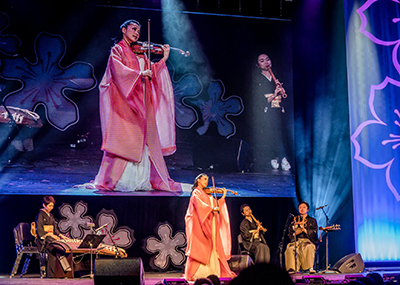 Performance at National Cherry Blossom Festival as “Japan 2019” (concert in Washington DC, U.S. by Ms. Kawai Ikuko and a Japanese traditional instrument ensemble; Photo: Japan Foundation)
Performance at National Cherry Blossom Festival as “Japan 2019” (concert in Washington DC, U.S. by Ms. Kawai Ikuko and a Japanese traditional instrument ensemble; Photo: Japan Foundation)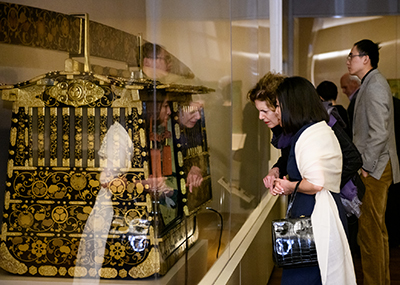 Scene from an installation at the “The Tale of Genji: A Japanese Classic Illuminated” and “Murasaki Shikibu: A Thousand Years of Anonymous Fame” exhibitions in New York: as “Japan 2019” (Photo: The Metropolitan Museum of Art / BFA.com)
Scene from an installation at the “The Tale of Genji: A Japanese Classic Illuminated” and “Murasaki Shikibu: A Thousand Years of Anonymous Fame” exhibitions in New York: as “Japan 2019” (Photo: The Metropolitan Museum of Art / BFA.com)In 2019, “Photo Exhibitions on Japan-Russia Relations” were held for about three weeks each in Krasnodar and Ekaterinburg, following on exhibitions held in 2018 in Moscow and St. Petersburg as part of the “Japan Year in Russia” initiative. In addition, the 53rd Japanese Film Festival was organized by the JF in Moscow. A Japanese director took the stage to speak at the opening of the festival, which continues from the festival held in 2018.
Diplomatic missions overseas carry out a range of cultural projects as part of efforts to promote a deeper understanding of Japan and expand the circle of people with a knowledge of Japan in the areas they cover. For example, they plan and implement events such as workshops on the tea ceremony, flower arrangement, and origami, as well as Japanese film screenings, Japanese music performances, martial arts demonstrations, traditional craft exhibitions, and Japanese speech contests. In recent years, they have also actively introduced Japanese life style and culture including pop culture such as anime and manga, as well as Japan's food culture.
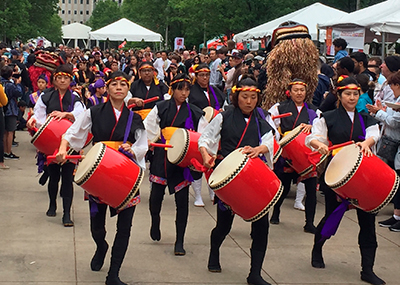 Cultural program: Japan Festival Chicago (June 16, Chicago, U.S)
Cultural program: Japan Festival Chicago (June 16, Chicago, U.S)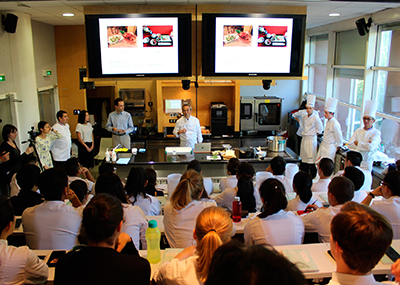 Cultural projects: Japanese Cuisine Lecture & Demonstration (October 8, Lyon, France)
Cultural projects: Japanese Cuisine Lecture & Demonstration (October 8, Lyon, France)Furthermore, in years that mark diplomatic milestones, MOFA collaborates with governmental and private organizations to carry out large-scale and comprehensive commemorative projects that include mutual visits of dignitaries, various conferences, and public relations and cultural projects with the aim of effectively promoting a deeper understanding of Japan. In 2019, a Noh performance and various other events were conducted to commemorate the 100th anniversary of the establishment of diplomatic relations between Japan and Poland.
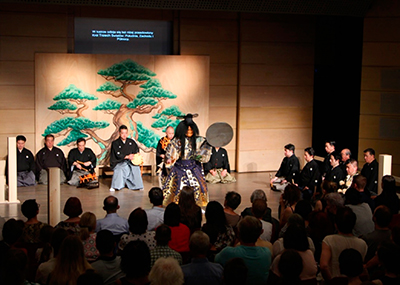 Noh performance to commemorate the 100th anniversary of the establishment of diplomatic relations between Japan and Poland (June 28, Warsaw, Poland)
Noh performance to commemorate the 100th anniversary of the establishment of diplomatic relations between Japan and Poland (June 28, Warsaw, Poland)In collaboration with MOFA and diplomatic missions overseas, the JF promotes and provides support for Japanese-language education and Japanese studies, as well as runs two-way arts and cultural exchange projects to promote Japanese culture and arts in a variety of forms throughout the world. In September the Japan Matsuri was held in London, attended by roughly 70,000 people and co-organized by the JF, Embassy of Japan in the UK, and other organizations. The event served to appeal various charms of Japanese culture and strengthen cultural exchange among both countries through an introduction to Japanese folk entertainment and a performance of Iwami Kagura, a traditional performing style originating in western Shimane Prefecture.
Furthermore, the Japan Foundation Asia Center has been steadily implementing the “WA Project: Toward Interactive Asia through Fusion and Harmony” announced by Prime Minister Abe in December 2013. The project provides support for Japanese-language education along with interactive arts and cultural exchange projects. One highlight of 2019 was the “Asia in Resonance 2019” event, which brought together the activities conducted in Japan and abroad over the last five years. The “NIHONGO (Japanese-language) Partners” program is a core project to support Japanese-language education, and part of pre-dispatch training was provided this year through Ritsumeikan Asia Pacific University with the goal of regional revitalization. Following this training, 2,375 Japanese citizens were dispatched mainly to secondary educational institutions in 10 Southeast Asian countries, China and Taiwan, where in addition to providing Japanese-language support they also engaged in exchange projects that entailed introducing Japanese culture. These efforts were warmly commended by many people affiliated with the schools in these countries and region, who appreciated the NIHONGO Partners helping motivate students to learn.
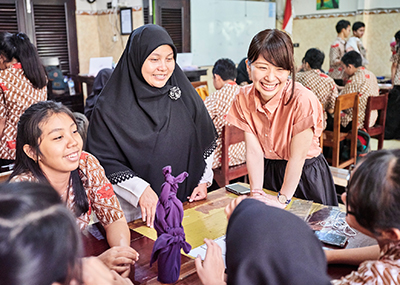 NIHONGO Partners at a host institution (Indonesia; Photo: Japan Foundation)
NIHONGO Partners at a host institution (Indonesia; Photo: Japan Foundation)In the two-way arts and cultural exchange program, the area of performing arts saw an international joint production of performances such as “DANCE DANCE ASIA,” which seeks to connect Asia through Street dancing. In the area of film, efforts were made to promote film exchange through collaboration with the Tokyo International Film Festival and through the Japanese Film Festival: Asia-Pacific Gateway Initiative. In the area of sports, a soccer exchange program was held in collaboration with the Japan Football Association and J-League, among other initiatives.
The Japan International MANGA Award was launched by MOFA in 2007 with the aim of rewarding manga creators who have contributed to the spread of manga culture overseas. The 13th International MANGA Award, held in 2019, received 345 entries from 66 countries and regions, and the Gold Award was given to a work from Israel. This year, there were Award entries from Zambia, Georgia, Bangladesh, Haiti, and Malta for the first time.
(3) People-to-People Exchange and Exchanges in the Area of Education and Sports
To build personal relationships and promote a better understanding of Japan, MOFA carries out a number of projects that invite foreign nationals who have a significant influence on shaping public opinion and the policymaking process and who are expected to play a leading role in various fields. In the area of education and sports, MOFA conducts various activities to promote people-to-people exchanges. These projects not only promote mutual understanding and friendships but also enhance Japan's presence in the international community, which considerably benefits Japan's national diplomatic interests.
A Student Exchange Programs
MOFA actively introduces the attractiveness and opportunities of studying in Japan to foreign students through Japanese diplomatic missions overseas. It also implements application and screening procedures to grant the Japanese Government (MEXT) Scholarship to promising students abroad. It also makes efforts to network with former foreign students who have returned to their home countries through Japan Alumni Associations and to foster their further knowledge on Japan.
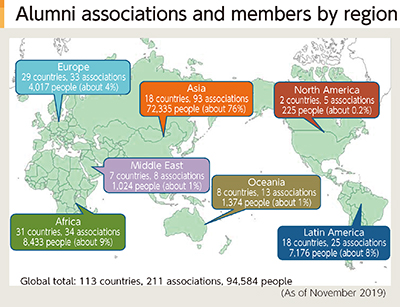

B JET Programme (The Japan Exchange and Teaching Programme)
The JET Programme was launched in 1987 to improve foreign language education in Japan and promote international exchange with Japanese citizens in local areas. In FY2019, a total of 5,761 people, including 2,091 new participants from 57 different countries, took part in the program and were dispatched all over Japan. This program is administered by local authorities and other organizations in cooperation with the Ministry of Internal Affairs and Communications (MIC), MOFA, the Ministry of Education, Culture, Sports, Science and Technology (MEXT), and the Council of Local Authorities for International Relations (CLAIR). Through the program, young foreign nationals are invited to Japan and appointed to posts in local governments and schools. MOFA is responsible for the application and screening process, pre-departure orientation, and support for the activities of the JET Alumni Association (JETAA), which operates in 18 countries and has about 24,000 members. JETAA conducts activities to introduce Japan in many countries. Many of those who went through the JET Program go on to work in a variety of fields around the world as supporters for Japan and Japan experts. They also become important human and diplomatic assets for Japan.
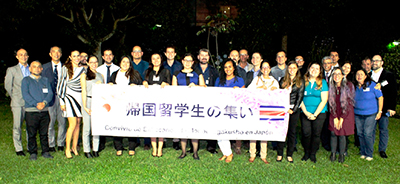 Get-together for alumni students (November, Costa Rica)
Get-together for alumni students (November, Costa Rica)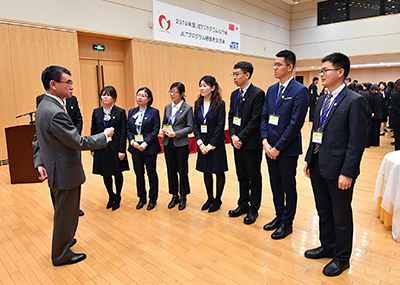 Foreign Minister Kono chatting with JET participants from China at a farewell party before their departure to Japan (April, China)
Foreign Minister Kono chatting with JET participants from China at a farewell party before their departure to Japan (April, China)C Sports Exchange
Sports enable communication beyond language and can be an effective tool for promoting friendly relations and a better understanding of Japan. As Japan gains more attention for the TOKYO 2020 Games, since January 2014 the Government of Japan has been implementing the “Sport for Tomorrow (SFT)” program as an international cooperation initiative through sports. This program offers various types of sports exchanges, and human development projects with the goal of spreading the value of sports to over 10 million people in more than 100 countries by 2020. The program achieved this goal ahead of schedule in September 2019. SFT also includes the “Projects for Sports Diplomacy Enhancement” scheme, started in FY2015, which is to dispatch and invite athletes and instructors, provide equipment, and hold sports-related receptions at diplomatic missions overseas. The projects have enabled MOFA to respond even more promptly and meticulously to requests from foreign governments and sports associations and develop bilateral relations. In the international sports community, these SFT programs have contributed to enhancing the presence of those engaged in sports in Japan. (see the Column on page 310).
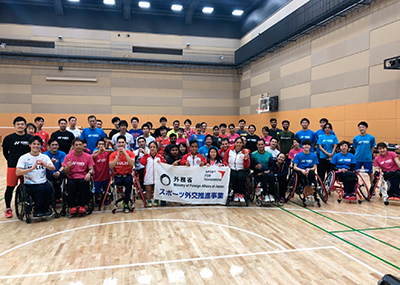 SFT Program: Peruvian Para-badminton athletes who participated in training with the Japan team (November, Japan)
SFT Program: Peruvian Para-badminton athletes who participated in training with the Japan team (November, Japan)The first Rugby World Cup (RWC) in Asia was held in Japan from September 20 to November 2, 2019. The Japan national rugby union team (“Japan team”) impressed many Japanese people with its players of various nationalities uniting as “One Team.” In this column, we interviewed three players of the Japan team about the keys to success in working with people from diverse backgrounds.
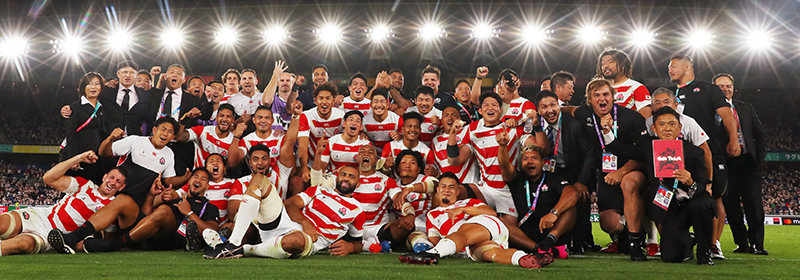 Group photo at RWC2019 (Photo: JRFU)
Group photo at RWC2019 (Photo: JRFU)Mr. Matsushima Kotaro (plays for Suntory Sungoliath, FB/WTB) *As of July 2020, he plays for ASM Clermont Auvergne in France.
 Mr. Matsushima Kotaro (Photo: Suntory Sungoliath)
Mr. Matsushima Kotaro (Photo: Suntory Sungoliath)Q: What do you think are the important factors for people of different backgrounds, such as nationalities, to work for the same goal and play as “One Team”?
Matsushima: In many cases, you cannot make yourself understood unless speaking out. It is essential to communicate with each other by speaking your mind and listening to others. By doing so, I believe you can make your purposes and goals clearer.
Q: I understand communication is extremely important, but I suppose some of the players faced a language barrier.
Matsushima: When the team does not perform well, we tend to have less communication. In the Rugby World Cup matches that we won through our own tactics and rugby style, we did communicate more closely than usual. In these matches, we communicated well through rugby without being hampered by the language barrier.
Q: With the advancement of globalization, it is becoming increasingly important to gain experiences abroad. Please tell us any lessons learned through your own experiences?
Matsushima: Because of my small build, I always place great importance on looking around. It is indispensable to understand what is required by your team while emphasizing what you want to do. Some foreign players are so intensely motivated that they are not allowed to play in games as they clash with their teammates.
In order to survive in such situations, I tried to find out my roles in the team and what I can do there. By doing so, I was able to gain valuable experience while abroad.
Q: What do you think is necessary for Japanese people to succeed on the global stage?
Matsushima: Regardless of where you are in the world, it is important to carry with you the spirit of “always improving yourself.” I believe that the Japan team has successfully demonstrated that Japan is internationally competitive, so it is also important to face difficulties and believe in your own strength.
Mr. Koo Ji-won (plays for Honda HEAT, PR)
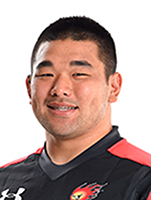 Mr. Koo Ji-won (Photo: Honda HEAT)
Mr. Koo Ji-won (Photo: Honda HEAT)Q: Please tell us your message that you wish to deliver to Japan and the world through rugby?
Koo: Although the Japan team is said to have a physical disadvantage in a scrum because of our physical size, we were able to take on the world with our unity. I hope you can recognize our unity by watching our games. I believe that unity is Japan's advantage and strength.
Q: You left your mother country, the Republic of Korea, and came to Japan when you were in junior high school. How did you overcome the difficulties during the hard times? Please also tell us memorable events in your life in Japan.
Koo: I sometimes got nervous about my rugby as well as my private life. At such times, more than ever, I focused single-mindedly on what I had to do. I vividly remember that people were so kind and treated me warmly when I first came to Japan, although I could not speak Japanese.
Q: Please share your message for Japanese youths who aim to advance their career abroad?
Koo: The most important thing is to believe in yourself and work hard to realize your dreams. This was also the message to myself when I was a young, unknown player.
Mr. Lafaele Timothy (plays for Kobelco Steelers, CTB)
 Mr. Lafaele Timothy (Photo: Kobelco Steelers)
Mr. Lafaele Timothy (Photo: Kobelco Steelers)Q: You came to Japan at 18 years old from your mother country Samoa and New Zealand, and have lived in Japan since then. What motivated you to come to Japan?
Lafaele: I visited Japan the year before I moved there with my high school team to play in the Sanix World Youth Tournament in 2009, and I got to experience a little bit of Japan. I enjoyed my time there, so I thought moving to Japan was something I could do. I wanted to travel, get an education, and continue to play rugby. I knew Japan could give me all of that, and it has. I eventually grew close with my friends from Yamanashi Gakuin University and made a home away from home. Coming to Japan was one of the best decisions I've ever made in my life!
Q: Through your own experiences, what do you think are the keys to succeed overseas?
Lafaele: For me, it was important to completely immerse myself into the Japanese culture and to learn the Japanese ways and make them become my own. But, at the same time, it was also important to never forget where I came from and to always remember my roots. I consider myself very lucky to be connected to more than one culture and this helps me in my career because it motivates me to become a better rugby player. An experience I will treasure forever, where I got to experience both of my cultures coming together, was when we played against my country of birth, Samoa, during the World Cup. I got emotional singing “Kimigayo,” sang it with pride and was so proud to wear the Japanese jersey. Then, the Manu Samoa team performed the “Siva Tau” (the Samoan war cry) before kickoff and I felt a sense of pride come over me and excitement! It motivated me to try and play my absolute best.
Q: Please tell us your message that you wish to deliver to Japan and the world through rugby?
Lafaele: One moment that stood out for me was seeing video footage, after our quarter final match versus South Africa, of a Japanese fan swapping his jersey with a South African fan. It is very common for players to do that after games, but seeing fans participate in that too was very heart warming. I truly believe that sport brings people of the world together.
Q: The Japanese teams in the Rugby World Cup was a good example of how players of different backgrounds such as nationality can achieve success by working as one toward the same goal. What do you think is important to share and achieve the same goal as “One Team”?
Lafaele: BELIEF. For me, it's important to BELIEVE in yourself, BELIEVE in each and every one of your teammates and managerial staff, and to BELIEVE in our abilities to achieve our shared goals, whatever it may be.
Q: Through your experiences in Samoa, New Zealand, and Japan, what do you think is necessary to live with people of different languages and nationalities?
Lafaele: Being able to call three very different countries “home,” I have learned how important it is to have an open heart and an open mind; understanding that everyone is different. This has allowed me to connect with people even if we have different beliefs and views on life. It has allowed me to form life-long friendships through rugby. Living in three different countries has taught me how to appreciate the beauty in our differences.
- A number of international sports competitions organized by the International Sports Federation were held in Japan in 2019. They include the Rugby World Cup from September to November in 12 cities of Japan, the Artistic Gymnastics World Cup in April in Tokyo, the World Judo Championships from August to September in Tokyo, the FIVB Volleyball World Cup from September to October in eight cities of Japan, and the Women's Handball World Championship from November to December in Kumamoto.
At the International Olympic Committee (IOC) Session held in September 2013 (Buenos Aires, Argentina) when the decision was made to hold the 2020 Olympic and Paralympic Games in Tokyo, Prime Minister Abe announced the launch of the Sport for Tomorrow (SFT) program in Japan as a program for contributing internationally through sports.
Under the SFT program, the Government of Japan has promoted various projects through an “All Japan” effort in public-private partnerships. Targeting more than ten million people in more than 100 countries including developing countries for over seven years from 2014 to 2020, this program aims to share the value of sports and the Olympic and Paralympic movement to people of all generations, including the promising youths, in order to create a better future for the world. MOFA has also been implementing a wide range of programs, including the development of sporting facilities, dispatching and inviting sports instructors and athletes, and introducing Japanese culture in the field of sports. At the end of September 2019, the SFT program recorded approximately 10.02 million participants across 202 countries and regions, reaching the set goal earlier than planned.
To date, MOFA has consistently undertaken various initiatives through international exchanges in the field of sports, such as Japanese martial arts (“budo”), to raise awareness and enhance understanding of Japan as well as to create a sense of affinity with Japan among many people in the world. Sports play an important role in promoting mutual understanding and facilitating international exchange that transcends borders, languages, and race. Together with the public, efforts are being made to bring about international exchange through sports so as to deliver the value of sports to the world from Japan even after the Olympic and Paralympic Games Tokyo 2020.
Voices from SFT participants
● From Tanzania
Support for the development of baseball grounds, provided through the Japan's Grant Assistance for Cultural Grassroots Project (GCGP), not only benefits baseball players in Tanzania but also all the citizens of Tanzania. Japan has introduced baseball to Tanzania as a new sporting activity. We are considering the introduction of baseball into the education curriculum of all elementary and junior high schools in Tanzania. (Prime Minister Majaliwa)
● From Madagascar
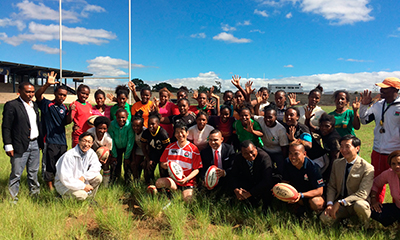 Parliamentary Vice-Minister for Foreign Affairs Yamada Kenji observing Japan Overseas Cooperation Volunteers providing guidance to the Madagascar women's rugby team. (March, Madagascar)
Parliamentary Vice-Minister for Foreign Affairs Yamada Kenji observing Japan Overseas Cooperation Volunteers providing guidance to the Madagascar women's rugby team. (March, Madagascar)Rugby is a popular sport in Madagascar, but many teams practice with old rugby balls. I believe the rugby balls donated to our teams through JICA will be very useful in helping to get our teams into the Olympics. We will continue to work hard for the development of rugby in Madagascar. (Chairman of the Madagascar Rugby Union, Rakotomalala)
● From South Sudan
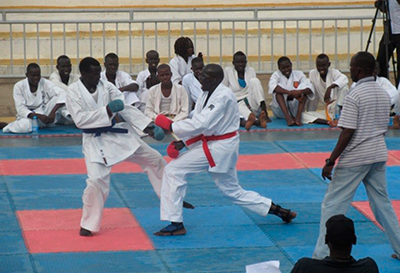 Athletes practicing in karate gear provided by Japan (South Sudan)
Athletes practicing in karate gear provided by Japan (South Sudan)While we receive various forms of assistance from Japan, I am grateful for the support that we receive for sports. In particular, it is noteworthy that, through Japan's cooperation in karate, the karate athletes are contributing to enhancing relationships and people-to-people exchanges between Japan and South Sudan. (Minister of Higher Education Tut)
● From Canada
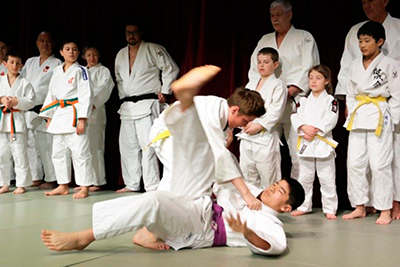 Judo demonstration (Canada)
Judo demonstration (Canada)The judo demonstration was very dynamic and powerful, and provided a valuable opportunity for learning about the profound meaning and appeal of judo. I am very much looking forward to the Olympic and Paralympic Games Tokyo 2020. For the judo event, I will cheer on both Japan and Canada with far greater interest than I ever used to. (Canadian participant in a judo demonstration held at the auditorium of Canada's foreign ministry)
● From Peru
This program aims to connect Japan with other countries through sports, and to promote international cooperation through sports, and I found the program excellent. In addition to sports, I was also exposed to Japan and its culture, making it an invaluable experience. (Peruvian para-badminton player: Mr. De Vinatea)
D Japan's Friendship Ties Programs
Through these programs, the Government of Japan invites and dispatches future leaders in information dissemination and the development of bilateral and region-to-region relationships between Japan and countries in the Asia-Pacific, North America, Europe, Latin America and the Caribbean. Along with promoting a better understanding of Japan's politics, economy, society, culture, history, foreign policy, and other elements, the programs produce supporters and experts of Japan. By having program participants actively conveying Japan's foreign policies and charms via social media and other channels, we are strengthening external communication and expanding Japan's diplomatic infrastructure.
(4) Exchange in the Intellectual Field
A Japanese Studies
The JF comprehensively supports a range of overseas research activities related to the politics, economy, society and culture of Japan. In 2019, the JF sent visiting professors, expanded the collection of books on Japan, provided dispensed research grants, and extended support for seminars and symposiums, to a total of 59 institutions of Japanese studies in 30 countries and regions. Fellowship was also granted to 150 Japanese studies researchers in 34 countries and regions, including those who started the fellowship in the previous year. The JF also provides support to academic societies with the goal of promoting network building among researchers and research institutions in places around the world.
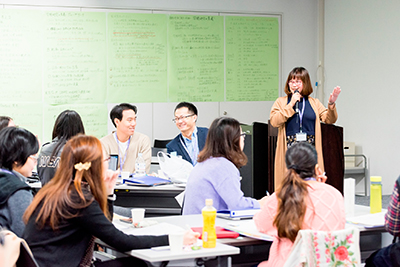 Collaborative Research Workshop for Aspiring Scholars in Japanese Studies
Collaborative Research Workshop for Aspiring Scholars in Japanese Studies (November, Japan; Photo: Japan Foundation)
B Intellectual Exchanges
MOFA also conducts intellectual exchange programs through the JF. Specifically, support is provided for seminars and symposiums on common international issues and programs such as lectures at major universities overseas that aim to deepen understanding of modern Japan. Additionally, support is provided for a grassroots invitational program for U.S. regional leaders that helps to strengthen Japan-U.S. relations, and, through cooperation with NPOs and other exchange organizations, MOFA organizes and supports exchange projects that strengthen relationships and deepen mutual understanding between people through dialogue in various fields and at various levels.
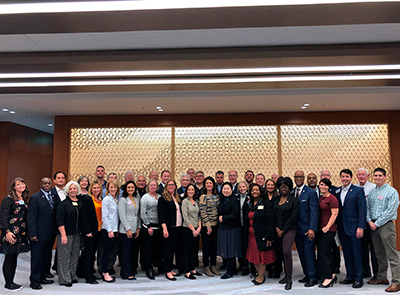 U.S. regional leader delegation for strengthening Japan-U.S. relations at the grassroots level (GEN-J program)
U.S. regional leader delegation for strengthening Japan-U.S. relations at the grassroots level (GEN-J program) (November, Japan; Photo: Japan Foundation)
C U.S.-Japan Conference on Cultural and Educational Interchange (CULCON)
CULCON is a public-private binational advisory panel comprising experts from Japan and the U.S. that discusses issues on educational and cultural exchange between the two countries. In June, a CULCON symposium entitled “Beyond 2020: Paving the Way for the Next Generation and U.S.-Japan Collaboration” was held in Austin, Texas. With the aim of promoting a better understanding of the U.S.'s efforts to achieve “multicultural symbiosis”, CULCON members from Japan and the U.S. visited San Antonio, where they toured Japanese factories and local universities in addition to exchanging views with concerned parties. Additionally, CULCON, Anniversaries, Inc., and the Dallas Regional Chamber of Commerce jointly convened an event about AI and possible cooperation between Japan and the U.S. in Dallas, Texas. The event saw participants conduct a lively exchange of views on the development and social impact of AI and related technologies.
D Cooperation with the United Nations University (UNU)
The UNU contributes to the international community through study and research on global issues and human resource development. Recognizing the organization's importance, the Government of Japan persuaded the organization to establish its headquarters in Tokyo and has provided support for its activities for close to 50 years. Through collaboration with Japanese universities and research institutions, the UNU engages in studies on international issues of importance to Japan, including peace, development, and the environment, and consequently helps introduce the policies of the Government of Japan. The UNU established Master's and Doctoral programs in 2010 and 2012 respectively, and has made efforts to improve the quality of its global human resource development programs.
(5) Promotion of the Japanese Language
As the globalization of Japan's economy prompts more Japanese companies to do business overseas and Japanese pop culture finds increasing global popularity, interest in learning Japanese is growing around the world, especially among young people. A better understanding of the Japanese language overseas naturally leads to a more favorable international environment for Japanese people and companies. A survey conducted by the JF in FY2018 found that approximately 3.85 million people in 142 countries and regions overseas learn Japanese. In 2019, the Japanese Language Proficiency Test offered by the JF was conducted in 307 cities of 87 countries and regions worldwide, with applicants numbering about 1.37 million, the highest number to date (including those taking the test in Japan). However, it is clear that a shortage of Japanese language instructors is a major challenge in the pursuit of satisfying the increasingly diverse interests in and needs concerning Japanese language learning in these many countries and regions.
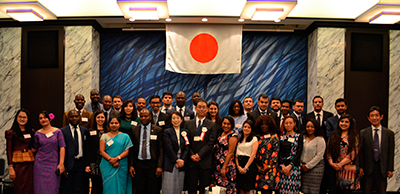 Reception for the participants of the Japanese Language programs for Foreign Service Officers (39th) and Public Officials (23rd) (November, Tokyo)
Reception for the participants of the Japanese Language programs for Foreign Service Officers (39th) and Public Officials (23rd) (November, Tokyo)Through the JF, MOFA works to address the diverse needs related to Japanese language education overseas. For example, MOFA dispatches Japanese language specialists abroad, carries out training programs allowing Japanese language instructors and foreign diplomats to learn the language in Japan, conducts preparatory Japanese language pre-arrival training for nurse and care worker candidates based on the Economic Partnership Agreement (EPA) with Indonesia and the Philippines, encourages educational institutions in each country and region to introduce Japanese language education and supports Japanese language educational activities, develops teaching materials, runs e-learning programs, and promotes the “JF Standard for Japanese-Language Education,” which corresponds with international standards for foreign language education.
To address labor force shortages in Japan brought about by aging and depopulation, Japan began accepting foreign workers under the new “Specified Skilled Worker” residence status in April. In line with this effort, MOFA conducts the Japan Foundation Test for Basic Japanese, which assesses the Japanese language ability of foreign nationals who come to Japan based on the “Comprehensive Measures for Acceptance and Coexistence of Foreign Nationals” (decided upon at December 25, 2018 Ministerial Conference on Acceptance and Coexistence of Foreign Nationals). MOFA is also taking new measures that include developing and disseminating learning materials and curriculum with the goal of fostering people's Japanese language ability effectively, as well as nurturing local Japanese language instructors who teach Japanese to those who wish to work in Japan.
(6) Cultural Grant Assistance
To promote culture and higher education in developing countries, and thereby enhance mutual understanding and friendly relations between Japan and these countries, the Government of Japan provides Cultural Grant Assistance as part of Official Development Assistance (ODA). The assistance implemented in 2019 consisted of two General Cultural Grant Assistance projects (totaling around 243 million Japanese yen) and 14 Grant Assistance for Cultural Grassroots Projects (totaling around 122 million Japanese yen). In 2019, General Cultural Grant Assistance was implemented with an emphasis on music, sound, and broadcasting, while Grant Assistance for Cultural Grassroots Projects centered on cooperation in promoting sports and the Japanese language.
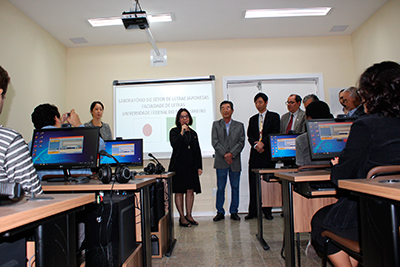 Ceremony to present Japanese language learning materials donated through Grant Assistance for Cultural/Grassroots Projects to the Federal University of Rio de Janeiro's College of Japanese Studies (August, Rio de Janeiro, Brazil)
Ceremony to present Japanese language learning materials donated through Grant Assistance for Cultural/Grassroots Projects to the Federal University of Rio de Janeiro's College of Japanese Studies (August, Rio de Janeiro, Brazil)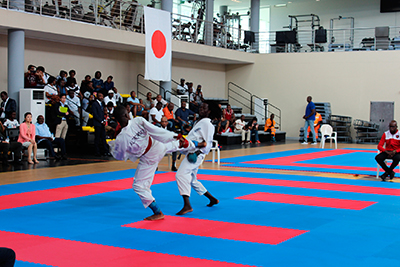 2nd Karate Ambassador's Cup, held using judo equipment provided through Grant Assistance for Cultural/Grassroots Projects (November, Angola, Rwanda)
2nd Karate Ambassador's Cup, held using judo equipment provided through Grant Assistance for Cultural/Grassroots Projects (November, Angola, Rwanda)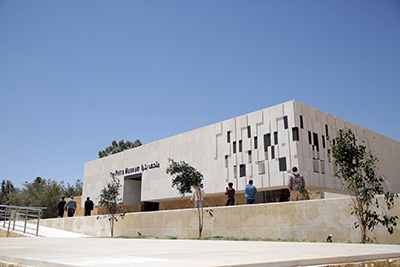 Petra Museum, built using General Cultural Grant Assistance (April, Jordan)
Petra Museum, built using General Cultural Grant Assistance (April, Jordan)(7) Cooperation through United Nations Educational, Scientific and Cultural Organization (UNESCO)
Japan is actively involved in a variety of UNESCO projects in the fields of education, science, and culture. Since 1951, when UNESCO became the first international organization to which post-war Japan became a member state, UNESCO has been cooperating with Japan on education, science, culture, and other fields in developing countries.
In the field of culture, Japan cooperates actively toward the preservation and promotion of the world's tangible and intangible cultural heritage, while providing support in the field of human resource development. Japan also actively participates in the international framework for safeguarding cultural heritage. As part of such activities, Japan supports many projects involving the preservation and restoration of sites such as Angkor in Cambodia and the Kasubi Tombs in Uganda, as well as post-earthquake recovery efforts for Cultural Heritage sites in Nepal. With Japanese experts playing a leading role, Japan also aids human resource development to enable local people to protect such sites by themselves in the future. In particular, since 1994 Japan has provided continuous support for preserving and restoring Angkor in Cambodia. In Afghanistan, since 2003 Japan has also been implementing a project to preserve and restore the Bamyan ruins, which hold a special place in the heart of the Afghan people. Also being implemented are projects to safeguard intangible cultural heritage, namely projects to pass on traditional performing arts such as music, dance, and traditional arts and crafts to the next generation in developing countries, as well as projects involving developing domestic institutions and capacity building for relevant parties to enhance countries' ability to protect intangible cultural heritage by themselves.
In the field of humanities, Japan is actively contributing to discussions aimed at formulating normative documents at UNESCO concerning AI ethics. During TICAD7 in August, Japan and UNESCO co-hosted the Panel Discussion on the application of AI, which was attended by experts from both parties. After presenting an overview of current AI utilization and emergency readiness technologies in Africa, participants discussed a plan for enhancing AI utilization in Africa that is modeled after examples of AI utilization, such as those in Japan's disaster readiness field, and that was inspired by UNESCO's efforts to utilize, and the organization's outlook on, AI.
Japan is also providing support for UNESCO's emergency preparedness initiatives. As one example, Japan is providing support in Africa, a region of focus for the organization, for serious flooding damage in Benin, Burkina Faso, Cameroon, Chad, Ivory Coast, Ghana, Guinea, Mali, Niger, Nigeria, and Togo. Furthermore, Japan has deployed and provided training in the usage of an early warning system at the International Centre for Water Hazard and Risk Management (ICHARM, a UNESCO category 2 center located in the city of Tsukuba)2 for flood prone areas, and has been engaging in capacity building to raise awareness concerning floods.
Japan also supports UNESCO's efforts at strategic transformation toward de-politicization under Director-General Azoulay, who took office in 2017. At a talk between Prime Minister Abe and Director-General Azouley during TICAD7 in August, the Director-General stated that she wished to continue to cooperate with Japan on strategic transformation and other initiatives including AI ethics being made by UNESCO. Prime Minister Abe expressed his proactive support for UNESCO's initiatives and transformation toward de-politicization.
- 2 An organization that carries out programs in collaboration with UNESCO. ICHARM split off from UNESCO and has been recognized by the General Conference as a UNESCO supporter.
A World Heritage Convention
The World Heritage Convention aims to protect cultural heritage and natural heritage internationally as heritage belonging to all mankind. Japan became a party to the Convention in 1992 (193 parties are in the Convention as of December 2019). The sites listed on the “World Heritage List” are known as “World Heritage Sites.” They are classified into “Cultural Heritage Sites” (monuments and remains), “Natural Heritage Sites” (natural areas), and “Mixed Heritage Sites” (sites with both cultural and natural elements). As of December 2019, a total of 1,121 World Heritage Sites are inscribed on the World Heritage List. At the 43rd session of the World Heritage Committee, held in Baku, Azerbaijan in 2019, it was decided to inscribe on the World Heritage List the “Mozu-Furuichi Kofun Group: Mounded Tombs of Ancient Japan” (Osaka Prefecture), upon nomination by Japan. The number of listed sites in Japan now stands at 23: 19 Cultural Heritage Sites and four Natural Heritage Sites.
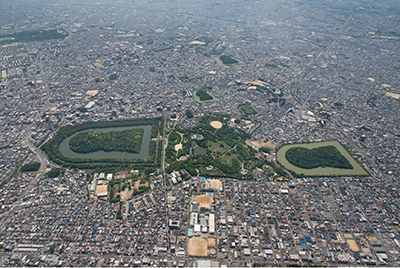 Mozu Tombs (one of the assets composing the Mozu-Furuichi Kofun Group; Photo: City of Sakai)
Mozu Tombs (one of the assets composing the Mozu-Furuichi Kofun Group; Photo: City of Sakai)B Convention for the Safeguarding of the Intangible Cultural Heritage
The Convention for the Safeguarding of the Intangible Cultural Heritage aims to develop an international system for safeguarding intangible cultural heritage such as traditional performing arts and traditional craftsmanship techniques (as of December 2019, the number of parties to the convention is 178). Japan, which has a wealth of experience in safeguarding domestic intangible cultural properties, has contributed actively by taking on a leading role in developing the Convention, laying down the main sections of the operational directives for the implementation of the Convention. As of December 2019, a total of 21 elements of intangible cultural heritage in Japan are inscribed on the Representative List of the Intangible Cultural Heritage of Humanity established in accordance with the Convention.
C UNESCO Memory of the World Programme
The UNESCO Memory of the World Programme was established in 1992 to preserve and promote valuable historical documents. As of December 2019, 427 items have been inscribed.
The fact that the submission and inscription of nominations was done without engagement of member states, despite the possibility of there being clear discrepancies between the views of the concerned member states, is in violation of the founding principle of UNESCO: promoting friendly ties and mutual understanding among member states. Improvements to the review process, while nomination cycle for new nominations had been stopped, are therefore being advanced. A revised action plan concerning the comprehensive review process was adopted at a meeting of the Executive Board of UNESCO held in October 2018. Extension of discussions for one year was decided at the session of the Executive Board of UNESCO held in October 2019. Discussions have since been held toward improving the process based on the plan.


